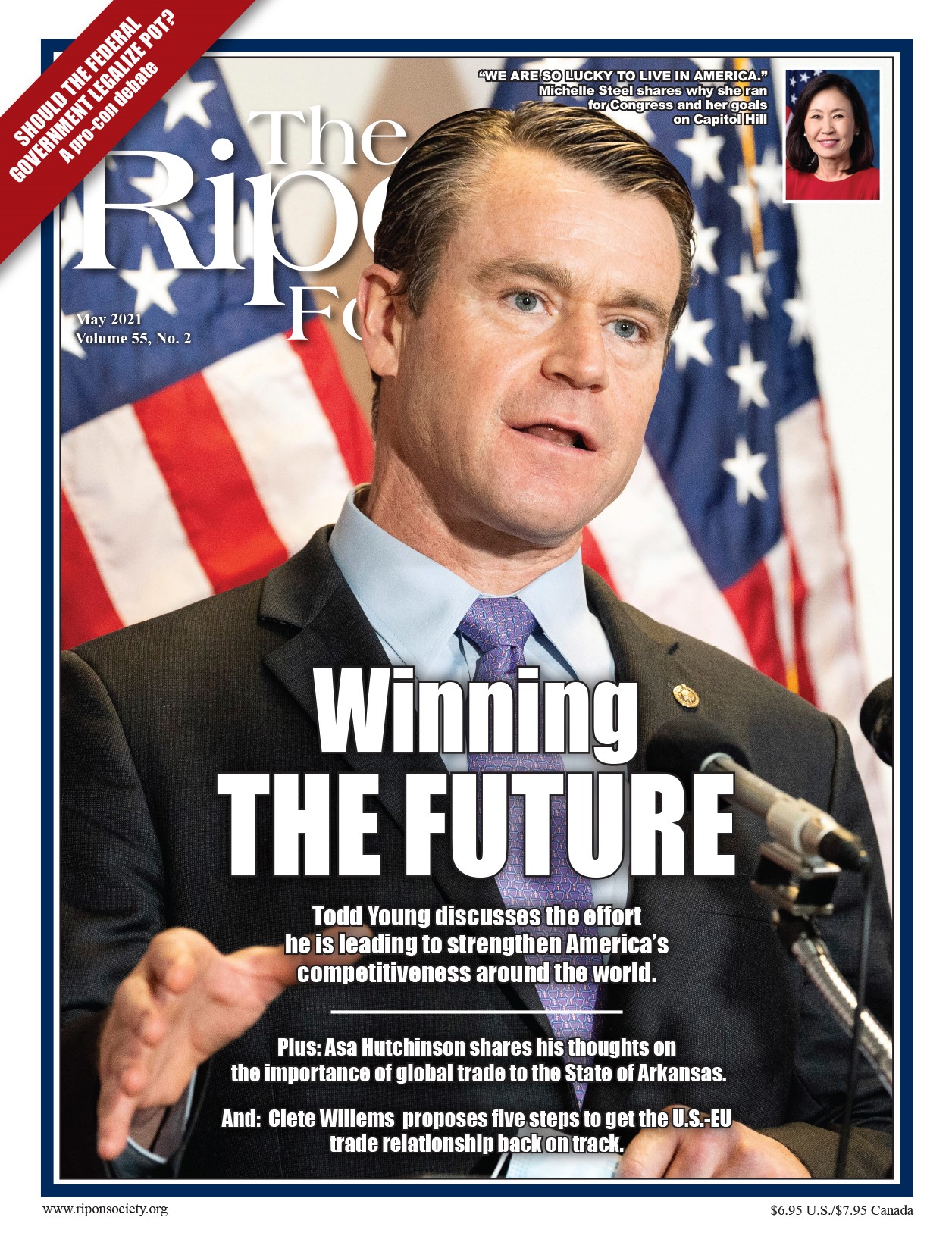Latest Ripon Forum shines a light on Senator Todd Young’s effort to strengthen America’s competitiveness around the world
 WASHINGTON, DC — If there was ever a loaded term in American politics, it is the term that has been used to describe U.S. foreign policy over the past four years — America First.
WASHINGTON, DC — If there was ever a loaded term in American politics, it is the term that has been used to describe U.S. foreign policy over the past four years — America First.
To some, it means America going it alone in international affairs — not being the world’s policemen sending our troops around the globe, and not being the world’s bank bailing other countries out.
Others define America First as the United States leading by example — being at the front of the line when it comes to standing up for freedom and justice and being a beacon of hope, and a refuge, for those who are oppressed. Former Indiana Senator Dan Coats expanded on this definition in an interview with The Ripon Forum a few years back.
“The old America First once attached to pre-war isolationism has led many to misinterpret the concept now relevant to the modern world,” Coats explained. “Isolationism was rejected back then as an irresponsible dream. Since then, American foreign policy has always been centered on American national interests, but as properly defined and accurately understood. Our core national interests — peace, prosperity, security—have always included nurturing everywhere our core values. Extending benefits of freedom, democracy, human rights, and free enterprise to others has always served our national interests. This is the real America First.”
Today, Coats’ successor in the Senate, Todd Young, is promoting a vision of America First similar to the one that Coats embraced. In its latest edition, The Ripon Forum shines a light on Young’s vision in this regard and, more specifically, the Indiana Senator’s work to ensure that America remains first in the world when it comes to science and technology.
“Today,” Young writes, “our leadership is being challenged by a state capitalist regime in Beijing that threatens to win the next century by dominating the critical technologies that are bound to shape it … The country that wins the race in key technologies — such as artificial intelligence, quantum computing, advanced communications, biotechnology, and more — will be the superpower of the future.”
Young has authored legislation called the Endless Frontiers Act to help the U.S. achieve this goal. He writes about the bill in the latest edition of the 55-year old centrist Republican journal and explains why he believes being first in the race in science and technology is key to winning the future.
To the extent that Young’s vision of America First requires an America that is reengaged around the world, this edition of the Forum also examines two areas where that can be achieved. In the first essay, Clete Willems, who served as Deputy Assistant to President Trump for International Economics, looks at the importance of the U.S.-EU trade relationship and proposes five steps to getting the relationship back on track. In the second essay, Anthony Kim & Terry Miller of The Heritage Foundation look at the Special Relationship between the United States and the United Kingdom and explain why a trade agreement between the longtime allies should be a top priority.
In other essays, Mark Linscott of the Atlantic Council examines the performance of the World Trade Organization in recent years and argues that 2021 could be a year of reform — or irrelevance — for the global intergovernmental group. And at a time when many Americans still believe the U.S. should turn inward and close its doors to the world, Governor Asa Hutchinson explains what trade means to his state, pointing out that, among other things, over 350,000 jobs in Arkansas are dependent upon access to and interactions with global markets.
With shortages of personal protective equipment and other pandemic-related supplies still fresh in the minds of many Americans, Nick Vyas, who serves as Executive Director of the University of Southern California’s Center for Global Supply Chain Management, looks at ways to strengthen global supply chains in the wake of COVID-19. Sarah Lawrence College Professor Samuel Abrams examines the fallout from cancel culture, while Kevin Sabet and Paul Armentano debate whether pot should be legalized in the United States.
And in the latest Ripon Profile, first-term Congresswoman Michelle Steel discusses her goals in office and what the American Dream means to her. “The American Dream to me means everyone has the opportunity to succeed and build a better life for themselves,” she states. “We are so lucky to live in America. English is my third language, and only in a country like ours could someone like me get elected to serve their community in Congress … This is my American Dream, and I want other young people to have the freedoms and opportunities to achieve their own American Dream.”
The Ripon Forum is published six times a year by The Ripon Society, a public policy organization that was founded in 1962 and takes its name from the town where the Republican Party was born in 1854 – Ripon, Wisconsin. One of the main goals of The Ripon Society is to promote the ideas and principles that have made America great and contributed to the GOP’s success. These ideas include keeping our nation secure, keeping taxes low and having a federal government that is smaller, smarter and more accountable to the people.



